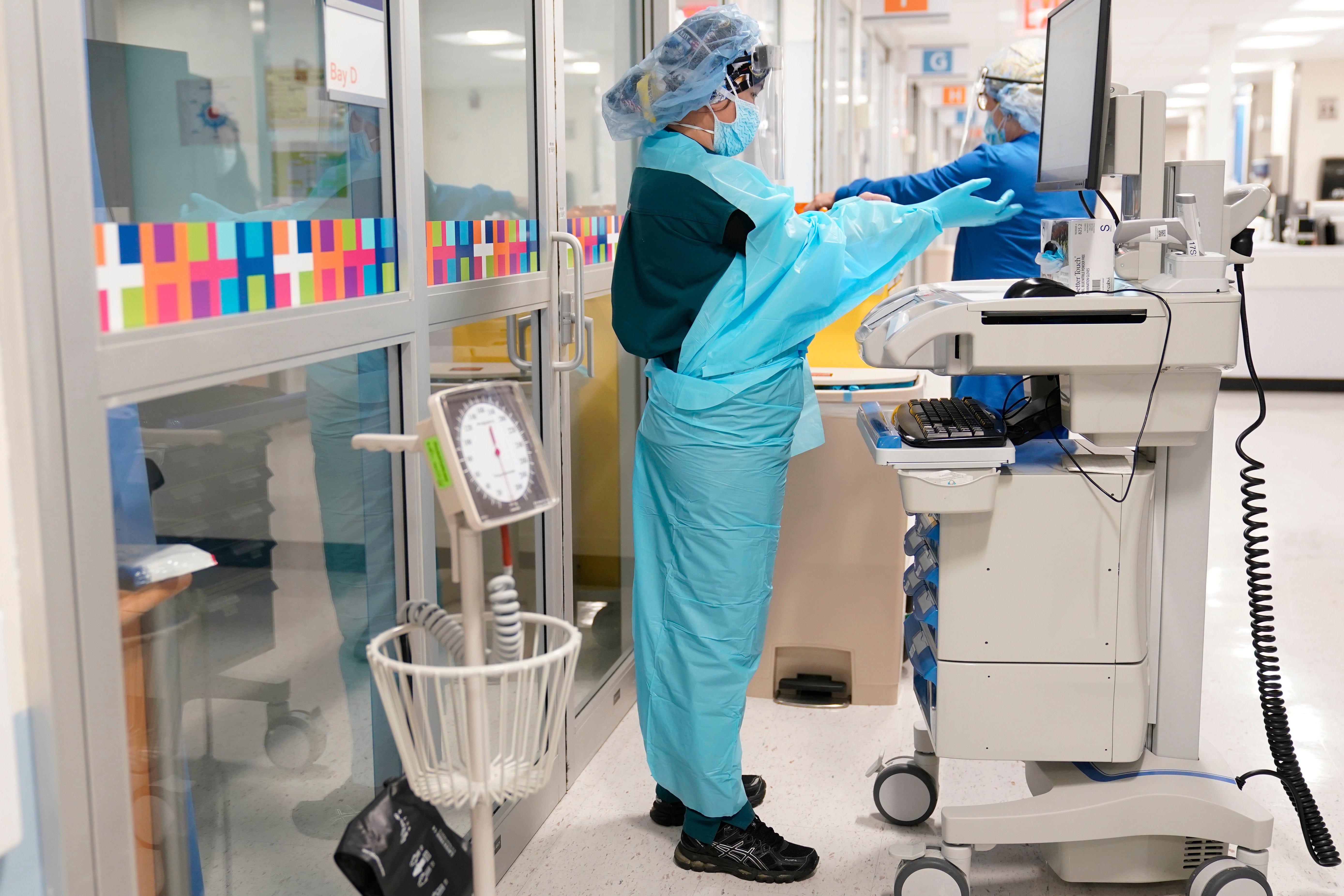State leaders facing 2nd wave resist steps to curb virus
Officials in many U.S. states being hit hard by the coronavirus are resisting taking stronger action to stop the spread, even as a long-feared second wave strains hospitals

Your support helps us to tell the story
From reproductive rights to climate change to Big Tech, The Independent is on the ground when the story is developing. Whether it's investigating the financials of Elon Musk's pro-Trump PAC or producing our latest documentary, 'The A Word', which shines a light on the American women fighting for reproductive rights, we know how important it is to parse out the facts from the messaging.
At such a critical moment in US history, we need reporters on the ground. Your donation allows us to keep sending journalists to speak to both sides of the story.
The Independent is trusted by Americans across the entire political spectrum. And unlike many other quality news outlets, we choose not to lock Americans out of our reporting and analysis with paywalls. We believe quality journalism should be available to everyone, paid for by those who can afford it.
Your support makes all the difference.Even as a long-feared second wave of coronavirus strains hospitals, officials in many hard-hit states are resisting taking stronger action to stop the spread, with public fatigue skepticism and political calculations running up against and contravening pleas from health experts.
Days before a presidential election that has spotlighted President Donald Trump's scattershot response to the pandemic, new virus infections continued to spiral Friday, eclipsing record caseloads that set off national alarms in the spring and summer.
During those earlier outbreaks, first in the Northeast and then in Sun Belt states, many governors closed schools and businesses and limited public gatherings.
But the new surge, despite being far more widespread, has brought a decidedly more limited response in many states. Most are led by Republican governors backing a president who insists, falsely, that the country is getting the virus under control.
Over the past two weeks, more than 76,000 new virus cases have been reported daily in the U.S. on average, up from about 54,000 in mid-October, according to Johns Hopkins University. Deaths, which usually lag case numbers and hospitalizations, are also rising, from about 700 to more than 800 a day.
The virus has now killed more than 229,000 Americans.
Nevertheless, many officials have resisted calls to enact measures like statewide mask mandates or stricter curbs on the size of gatherings, casting the response to the virus as a matter of individual decision-making.
“At the end of the day, personal responsibility is the only way. People will either choose or not choose to social distance, or choose to wear a mask or not,” said Tennessee Gov. Bill Lee, a Republican. “What we can do is to remind them is that personal responsibility can protect them.”
Lee's state is among those without a blanket mask mandate despite a study released this week showing that areas of Tennessee where people are not required to wear them are seeing the most hospitalizations.
In Iowa, where a record 606 coronavirus patients were hospitalized Friday, one health expert said officials there had been too quick to reopen, along with several neighboring states.
“If we follow the course that the other Midwestern states like Wisconsin, North Dakota and South Dakota have, we’re going to have trouble keeping up,” said Dr. Ravi Vemuri, an infectious disease specialist at MercyOne hospitals.
Republican Gov. Kim Reynolds, who has rejected mask requirements and said Iowans must learn to live with the virus, continued this week to downplay efforts to contain it.
On Wednesday, Reynolds, who has made frequent campaign appearances for Trump and other candidates surrounded by crowds of maskless supporters, poked fun at Theresa Greenfield, a Democrat running in a tight Senate race, for suspending a campaign tour after a staff member was exposed to someone who tested positive.
“Theresa didn’t get very far on her RV tour, did she?” Reynolds said with a laugh. She went on to accuse Greenfield and other Democrats of “hiding in their basements.”
In Utah which is also one of the nation's worst hotspots, Republican Gov. Gary Herbert has ordered mask mandates and limited social gatherings to 10 people or fewer only in counties with the highest transmission rates, not the entire state. The latter measure includes exceptions for religious services and school events.
“This is not an easy thing to enforce. As you drive down the road, you talk about people getting tickets for speeding, but how many are actually speeding?" Herbert said when asked about his resistance to broader mandates.
On Thursday, anti-mask protesters gathered outside the home of Utah state epidemiologist Dr. Angela Dunn, who has recommended that the state reinstate restrictions to avoid overwhelming hospitals.
“It’s taken a really big toll on my family and myself,” Dunn said. “I think it’s really unfortunate we live in a state where people feel that it is OK to harass civil servants.”
Herbert, who has not heeded Dunn's recommendation, said protesters were within their rights to criticize him or other elected officials, but that they should leave state employees alone.
"I know we’re asking a lot of the people of Utah to be patient,” the governor said. “We know that their time is valuable. I would hope that they would put that in a constructive effort.”
___
Geller reported from New York.